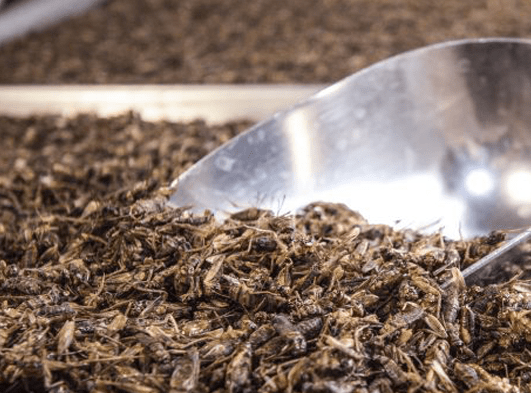Vietnamese insect protein startup Cricket One has closed a pre-Series A funding round led by Singapore-based family office Corecam Capital Partners. Existing investor Masik Enterprises, also from Singapore, participated in the fundraise alongside two unnamed angel investors.
Financial details of the round were not disclosed, though Cricket One co-founder and CEO Nam Dang told AFN that Corecam’s commitment was a seven-figure US dollar amount.
Based a few hours’ drive outside of Ho Chi Minh City, Cricket One is aiming to become a ‘full stack’ production powerhouse for insect-based protein. It breeds and raises house crickets — using tech to make its farm as efficient as possible — before processing the critters into a variety of protein-rich powders and oils for use as ingredients in the food manufacturing industry. It currently processes more than 100 million crickets each month.
“Unlike most of our competitors [we] have great control over the [whole] cricket supply chain,” Nam told AFN. “We have performed research on cricket physiology and are producing our own feed which is 100% plant-based.”
Cricket One’s farming system has been developed in house and is “highly autonomous,” he added.
“We also collaborate with several institutions to develop new applications [for cricket protein.] The path forward is to normalize insect consumption by serving tasty and sustainable food derived from crickets.”
That is perhaps the main challenge facing insect protein startups worldwide. While insects have been a commonplace component of human diets in some parts of the world — including Cricket One’s home region of Southeast Asia — their consumption remains taboo across most of the globe.
House cricket à la mode
The Vietnamese company is hoping to make entomophagy “trendy “for urban dwellers in developed and fast-developing countries. To do that, it’s aiming to ride the wave of alt-protein popularity and tout cricket protein’s sustainability credentials – while also offering it in a more familiar, broadly palatable guise.
“Most people we interviewed said they would eat insects if they did not see them in their whole form,” said Nam in reference to market research the startup conducted to get a better grasp on consumer likes and dislikes when it comes to insect protein.
Cricket One is shipping its cricket powder to food producers in over 15 countries — including bakeries and snack makers in Europe, North America, and Asia Pacific — but further growth in these and new markets has proven a challenge.
“It’s a great product and is getting more popular, but the consumption frequency of cricket powder is less, as it’s [typically] used in energy bars, shakes, snacks, and similar products,” Nam explained.
“When we were building the roadmap for crickets to reach a wider audience, we thought it had to be in a familiar form that could potentially go into a daily meal. There is nothing more familiar than a burger patty,” he said.
Fewer ingredients than an Impossible Burger
Cricket One’s new patty product has been polished by the startup’s research team in accordance with criteria including taste, texture, appearance, mouthfeel, and juiciness. Made only with cricket protein and plants, it contains fewer than 10 ingredients – less than the wholly plant-based Impossible Burger, as Cricket One senior researcher Kha Chan Tuyen keenly pointed out in a statement. Nam claims the patty has also “beaten” baseline criteria set by competing products in consumer testing after nine months of development.
“The response so far has been fantastic. Even first-time insect eaters had no problem consuming the burger,” he said.
“They couldn’t tell it’s not beef. Several Japanese customers claimed it is the best meat alternative burger they ever tried. We are in the last steps to get it into a couple of chains in Vietnam.”
Sausages, as well as fillings for dumplings and pies, are next on the menu from Cricket One.
Sustainable development goals
The startup’s focus on sustainable development goes beyond the alt-protein perspective. Its crickets are fed using agricultural byproducts, while it also aims to promote cricket rearing as a lower cost — and, eventually, lower risk — alternative income source for Vietnam’s smallholder farmers. It says it is “dedicated to making a valuable contribution to achieving the UN goals for sustainable development.”
Nam said the pre-Series A funding will be used “to bring crickets to mainstream audience.”
“[We] are devoting a great deal of effort on meat alternative products,” he continued. “The proceeds will be used to enhance our standing in that market, especially with foodservice and grocery clients. Part of the new funding will be used to boost our R&D capacity.”
Corecam’s role as lead investor brings a “strong network in Europe [that] will add a lot of value to our business,” Nam said.
The firm’s managing partner, Maximillian Hoenigsmann, said it is “a strong believer in the future of insect proteins as a sustainable solution to growing global protein demand.”
“Cricket One has done a phenomenal job to build a scalable yet cost efficient model based on innovation and careful management.”
The startup previously raised seed funding from Masik and 500 Startups in October 2019.
Got a news tip? Email me at [email protected] or find me on Twitter at @jacknwellis




